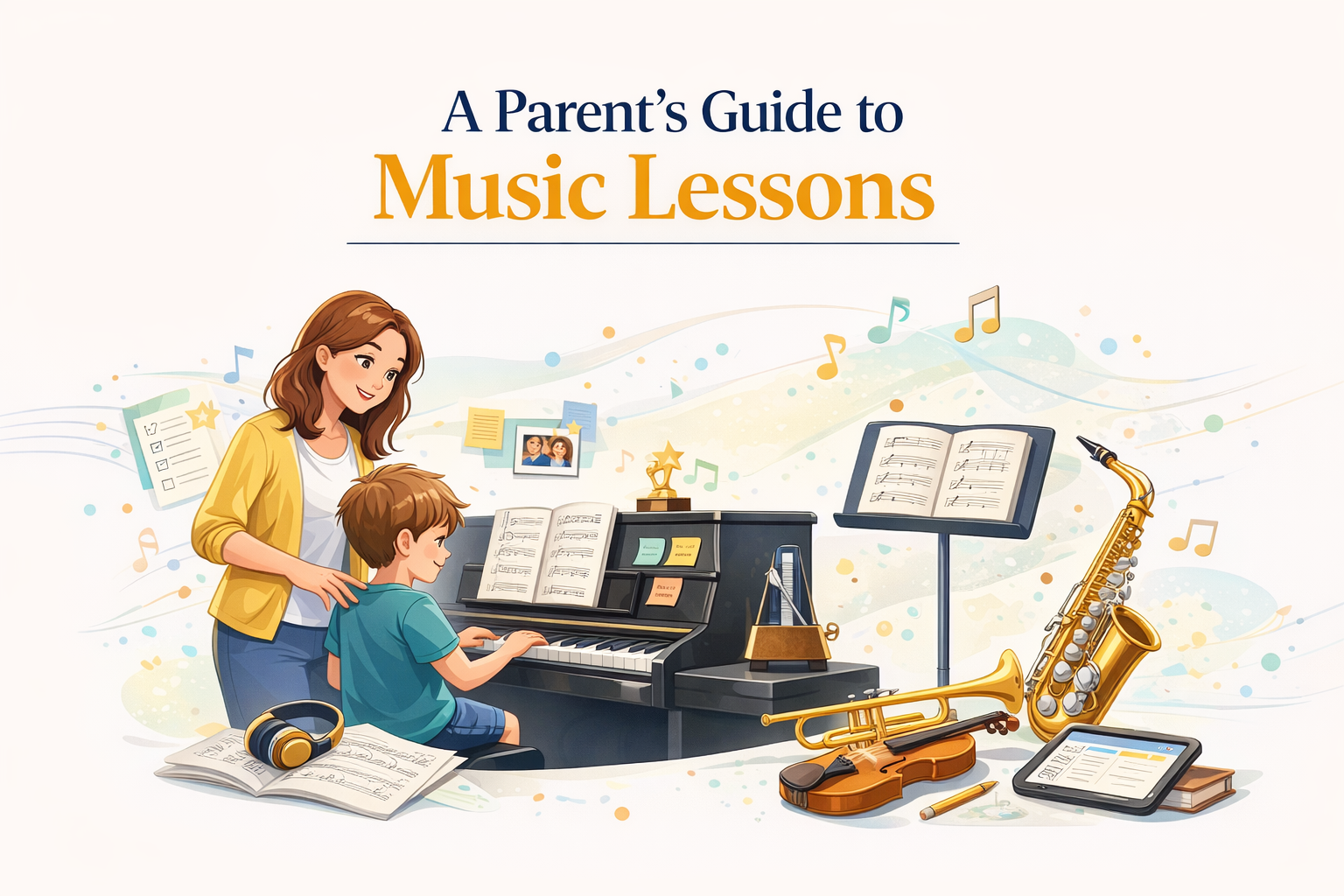A Parent’s Guide to Music Lessons
This parent’s guide to music lessons is a comprehensive guide covering everything a parent should know before enrolling a student in music lessons.
Choosing lessons can shape a child’s musical journey in powerful ways. When parents of young students understand what to expect, they are better equipped to support their child in music and help them build confidence, curiosity, and discipline through learning an instrument.
This guide to music lessons is written as a practical guide for parents navigating their child’s musical education for the first time.
How Much Do Music Lessons Cost?
Cost is often the first question parents ask before they enroll your child in lessons.
You should expect to pay between $15 and $50 for a half-hour lesson, and $30 to $100 for an hour-long lesson. Pricing depends on several factors, including whether the instruction is private music or part of a school-based program.
Common factors that affect cost include:
- Lesson length
- Experience level of the music teacher
- Location of instruction
- The musical instrument your child chooses
- Whether lessons are purchased individually or in advance
Private music lessons often cost more than group instruction, but they offer focused, one-on-one attention that many music educators believe leads to better outcomes for young musicians.
When Should a Child Start Music Lessons?
Most music students begin lessons in middle school, though some start earlier with piano or violin. Starting younger can work well, but it depends on the child’s attention span and physical readiness.
Before enrolling lessons for kids, consider:
- Whether your child is ready to play and follow directions
- Whether the instrument fits their body size
- Whether they have enough time to practice consistently
Many instruments are built for adult bodies. Playing a large instrument as a child can slow progress and create frustration. Even within string instruments, options like violin, viola, and cello come in different sizes to support learning a musical instrument safely and comfortably.
Why Take Music Lessons?
The benefits of music extend far beyond performance.
Music instruction teaches students how to set goals, manage challenges, and reflect on progress. These skills help students learn how to work toward long-term goals, whether they plan to make music casually or pursue advanced opportunities.
Music lessons also help build self-confidence. When students learn to play something difficult, they experience real accomplishment. This confidence often carries into academics and social settings.
Music also plays an important role in cultural understanding. Long before modern education systems, music was part of how people expressed identity, history, and emotion. The pursuit of music helps children connect to that tradition.
How to Find the Best Music Teacher
Finding the best music teacher starts with recommendations. Ask school directors, local music educators, or families whose children are thriving.
A strong music teacher should welcome trial lessons. This gives the teacher and student a chance to connect and helps parents evaluate teaching style.
During a lesson, watch how the teacher and student interact. A good teacher will listen carefully, offer specific feedback, and explain ideas clearly.
If a teacher dominates the lesson without engaging the student, or seems distracted, it’s best to keep looking. The best music teacher creates a space where students learn actively.
How Often Should Lessons Happen?
Most students benefit from weekly lessons lasting between 30 minutes and one hour.
Weekly lessons allow time for feedback, reflection, and adjustment. Taking multiple lessons close together is less effective than spreading learning out over time.
Learning to play an instrument requires repetition. Students need time between lessons to process ideas and build habits through music practice.
Some teachers also offer studio classes or group sessions, which can supplement private lessons and allow students to play along with peers.
How Parents Can Support Learning at Home
Progress happens between lessons, during practice at home.
Parents don’t need to be professional musicians to help. What matters is structure and encouragement.
Ways parents can support learning include:
- Ensuring there is time to practice each day
- Asking about assignments and goals
- Supporting healthy practice habits
- Encouraging consistent practice instead of last-minute cramming
A child’s practice becomes more effective when parents understand what the teacher is listening for and how students learn best.
Choosing the Right Instrument
When learning an instrument, the right fit matters more than popularity.
Some children want to play an instrument because they love the sound. Others are drawn to after-school band or orchestra programs. Both are valid reasons.
Consider physical size, interest level, and access to instruction. A child may love the sound of bassoon, but access to teachers and resources may be limited.
Starting with a common instrument can help students learn fundamentals before branching out.
A Guide to Learning and Long-Term Growth
This guide to learning emphasizes patience and curiosity. Not every student will become one of the top musicians, and that’s okay.
What matters is that students learn how to learn, read music, and enjoy the process. Many professional musicians started with modest goals and grew through consistent effort.
For some families, music remains a lifelong hobby. For others, it becomes a calling. Both paths are valid.
Final Thoughts for Parents
This parent’s guide is meant to support parents through the early stages of their child’s musical education.
Learning to play an instrument is not just about sound. It’s about discipline, creativity, and identity. Music-making helps children express themselves in ways words cannot.
When parents understand what parent needs to know before starting lessons, they can better support their child’s practice, motivation, and growth.
A strong foundation leads to success in music, whether the goal is performance, enjoyment, or lifelong appreciation.
